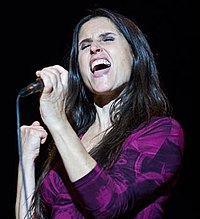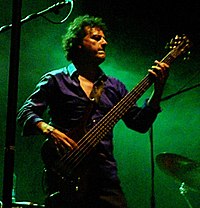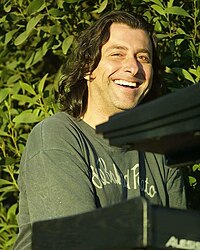Fulano (band)
The band's strongest influences and sources were almost unattainable in the isolation and repression of Pinochet's dictatorial Chile in the early 1980s, such as Weather Report, Return to Forever, King Crimson, Magma, Frank Zappa, Hermeto Pascoal, Miles Davis, John Coltrane, also singers like Maggie Nicols, Ursula Dudziak, Meredith Monk and Janis Joplin as well as the European avant-garde movement "Rock in Opposition" characterised by its rejection of the music industry.
The following year they released their first self titled album (which contained fan favourites Maquinarias, Tango, Fulano, 1989, Suite Recoleta and Calcetín perseguido), through which they broke through to a larger and more heterogenous audience, away from the academic minded one of their origins.
Their unique sound, the versatile voice of Arlette Jequier and the multi-instrumentalist prowess of the band members made the project grow, which in its beginnings was cataloged as a derivative of jazz fusion, however, as Vivanco clarified at the time, "none of us studied that style or dares to consider himself a jazzman".
During 1991 and 1992, the group dedicates itself completely to the composition of their new album, which finally comes out in 1993, dubbed El infierno de los payasos (Hell of the Clowns), from which they produced their first and only video clip, Lamentos.
This album features Godzilla, Canción formal (En 7/8), Más allá del deber, Rope, cochi, loma (a sophisticated arrangement of the theme Perro chico malo, or 'Little bad dog'), Krikalev and Arañas de tribunal.
As a way to honour his memory and end the band on a high note, the remaining members of Fulano released a live album "Vivo" (2004), culled from concerts in 2002, that is, their last dates before Vivanco's death.
At the request of Mike Patton (who counted Fulano as major influence in their music), they joined Faith No More on their tour of Chile, with a concert held at the Bicentennial Municipal Stadium of La Florida on December 5, 2010, where they also shared the bill with Primus and Monotonix.
"We inform you of the incorporation into our project of the talented singer and pianist Francisca (Paquita) Rivera and the versatile Cristóbal Dahm in Saxo Baritone, Tenor and Clarinet", as well as the return of Rafael Chaparro to replace the newly retired Jaime Vázquez, and Christopher Schönffeldt on drums.
With star guests, such as "pal bands" Santiago del Nuevo Extremo and MediaBanda, in addition to Pedro Foncea (from De Kiruza), Angelo Pierattini (from Weichafe), and the former drummer Guillermo Valenzuela.
In 2015, after a tour through Chile that included cities such as Iquique, Valparaíso, Santiago, Talca, Concepción, Temuco, and Valdivia, the group focused on recording their expected new album, titled Animal en Extinción (Endangered animal), which finally was released in December 2015, its first studio album in 18 years, with Crisosto and Campos the only original members; with Paquita Rivera in voice, Rafael Chaparro and Cristobal Dahm in saxophones, Felipe Muñoz in keyboards and Álvaro Poblete in drums.
The album opens with a tranquil theme by the deceased Jaime Vivanco, to then deploy a contestatory and non-conformist lyric, along with the characteristic music of great rhythmic, melodic and structural development.
Simultaneously, a live album is released En La Batuta 1993 recorded in 1993 in Plaza Ñuñoa with the original line-up and with an unpublished Vivanco track entitled Alfa Ralfa Boulevard.
However, after the release of the album, they announce the final dissolution of the band due to differences between Campos and Crisosto, bringing to an end 31 years of avant-garde musical history and cultural resistance.
In January 2020 they release the first single from their latest album entitled Maquinarias (Machinery) in tribute to Fulano, with the classic "Adolfo, Benito, Augusto y Toribio", at the Museum of Memory and Human Rights and in the context of the Social Outbreak.



